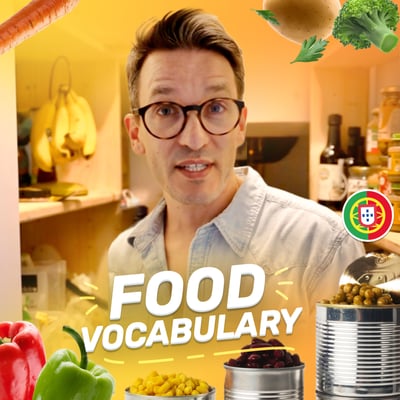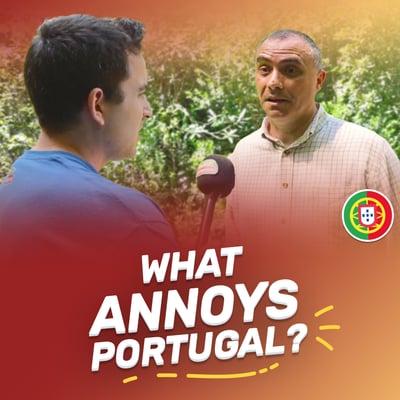1
00:00:00,000 –> 00:00:00,760
Olá!
{{Hello!}}
2
00:00:00,760 –> 00:00:02,600
Olá!
{{Hello!}}
3
00:00:02,600 –> 00:00:04,829
Bem, hoje estamos aqui
{{Well, today we’re here}}
4
00:00:04,831 –> 00:00:07,400
para fazer um vídeo sobre o…
{{to make a video about…}}
5
00:00:07,400 –> 00:00:10,057
São Martinho!
{{St. Martin!}}
6
00:00:10,057 –> 00:00:12,643
Castanhas, castanhas…
{{Chestnuts, chestnuts…}}
7
00:00:12,643 –> 00:00:15,143
E é o que nós vamos agora fazer.
{{And that’s what we’re going to do now.}}
8
00:00:15,143 –> 00:00:18,914
Nós vamos comprar castanhas na rua,
{{We’re going to buy chestnuts in the street,}}
9
00:00:18,914 –> 00:00:23,360
porque, em Lisboa e também noutras cidades,
{{because, in Lisbon and in other cities too,}}
10
00:00:23,360 –> 00:00:25,280
há muitos senhores e senhoras,
{{there are many gentlemen and ladies,}}
11
00:00:25,360 –> 00:00:28,680
vendedores de castanhas, na rua.
{{who sell chestnuts in the street.}}
12
00:00:28,680 –> 00:00:30,200
Assadas, assadas…
{{Roasted, roasted…}}
13
00:00:30,200 –> 00:00:32,800
Castanhas assadas!
{{Roasted chestnuts!}}
14
00:00:32,880 –> 00:00:36,160
E então, para acompanhar as nossas castanhas,
{{And then, to accompany our chestnuts,}}
15
00:00:36,160 –> 00:00:37,808
vamos comprar o quê, Joana?
{{we’ll buy what, Joana?}}
16
00:00:37,808 –> 00:00:39,200
Jeropiga.
{{Jeropiga.}}
17
00:00:39,200 –> 00:00:41,264
Tu tens alguma tradição que
{{Do you have any traditions that}}
18
00:00:41,264 –> 00:00:43,469
faças nesta altura do outono,
{{you do at this time in the fall,}}
19
00:00:43,469 –> 00:00:47,574
porque as castanhas abrem a época do outono,
{{because chestnuts open (mark the beginning of) the fall season,}}
20
00:00:47,774 –> 00:00:49,440
a estação do outono.
{{the fall season.}}
21
00:00:49,440 –> 00:00:51,862
Sim, é uma época muito rica
{{Yes, it’s a very rich season}}
22
00:00:51,862 –> 00:00:54,077
[na] região de onde venho,
{{in the region I come from,}}
23
00:00:54,077 –> 00:00:55,000
que é o Alentejo.
{{which is the Alentejo.}}
24
00:00:55,080 –> 00:00:56,531
Uma região muito rica
{{A region very rich}}
25
00:00:56,531 –> 00:00:59,720
em árvores de frutos secos.
{{in nut trees.}}
26
00:01:00,280 –> 00:01:02,760
Então, quer dizer que tu, normalmente,
{{So, does that mean that you normally}}
27
00:01:02,760 –> 00:01:04,700
comes castanhas em casa,
{{eat chestnuts at home,}}
28
00:01:04,700 –> 00:01:05,800
nesta altura do ano?
{{at this time of year?}}
29
00:01:06,360 –> 00:01:09,440
Agora, a viver em Lisboa e num apartamento…
{{Now, living in Lisbon and in an apartment…}}
30
00:01:09,440 –> 00:01:11,977
Mas no Alentejo também comíamos assim,
{{But in the Alentejo we also ate them like this,}}
31
00:01:11,977 –> 00:01:14,800
assadas no forno, só com sal.
{{roasted in the oven, just with salt.}}
32
00:01:14,840 –> 00:01:16,720
Também é muito comum fazer com carne.
{{It’s also very common to make them with meat.}}
33
00:01:16,800 –> 00:01:18,746
Também se faz puré de castanha,
{{Chestnut puree is also made,}}
34
00:01:18,746 –> 00:01:20,238
pão de castanha.
{{chestnut bread.}}
35
00:01:20,238 –> 00:01:23,080
O fruto, a castanha, é tornado [em] farinha…
{{The fruit/nut, the chestnut, is made into flour…}}
36
00:01:23,080 –> 00:01:25,040
E depois daí faz-se o pão de castanha.
{{And then from there, chestnut bread is made.}}
37
00:01:25,040 –> 00:01:27,320
Eu gosto muito de castanha cozida
{{I really like boiled chestnuts}}
38
00:01:27,400 –> 00:01:30,480
porque gosto muito do sabor de…
{{because I really like the taste of…}}
39
00:01:30,560 –> 00:01:31,631
Da erva-doce?
{{Anise?}}
40
00:01:31,631 –> 00:01:32,423
Da erva-doce!
{{Anise!}}
41
00:01:32,520 –> 00:01:33,000
Que bom.
{{That’s good.}}
42
00:01:33,000 –> 00:01:33,720
É muito bom.
{{It’s very good.}}
43
00:01:33,720 –> 00:01:34,360
É aromática.
{{It’s aromatic.}}
44
00:01:34,360 –> 00:01:35,600
É, gosto muito.
{{Yeah, I like it a lot.}}
45
00:01:35,600 –> 00:01:36,834
Então, em casa,
{{So, at home,}}
46
00:01:36,834 –> 00:01:39,877
nós normalmente fazemos mais cozidas,
{{we usually make (them) more boiled,}}
47
00:01:39,877 –> 00:01:42,546
mas também gostamos muito de fazer no forno,
{{but we also like to make (them) in the oven,}}
48
00:01:42,546 –> 00:01:44,570
como tu disseste, assadas com sal.
{{as you said, roasted with salt.}}
49
00:01:44,600 –> 00:01:46,254
As castanhas começam o outono
{{Chestnuts begin the fall}}
50
00:01:46,254 –> 00:01:48,086
e abrem a estação do outono, não é?
{{and open (usher in) the fall season, don’t they?}}
51
00:01:48,086 –> 00:01:49,808
Mas, na realidade, não está muito frio.
{{But in reality, it’s not very cold.}}
52
00:01:49,808 –> 00:01:51,285
Não, nenhum frio.
{{No, not cold at all.}}
53
00:01:51,285 –> 00:01:53,120
É o verão de São Martinho.
{{It’s the summer of St. Martin.}}
54
00:01:53,120 –> 00:01:54,160
Feliz São Martinho!
{{Happy St. Martin!}}
55
00:01:54,240 –> 00:01:55,800
E agora vamos comer castanhas.
{{And now let’s eat chestnuts.}}
56
00:02:12,240 –> 00:02:13,792
E é oficial!
{{And it’s official!}}
57
00:02:13,792 –> 00:02:17,080
Temos jeropiga e castanhas.
{{We have jeropiga and chestnuts.}}
58
00:02:17,080 –> 00:02:19,277
Agora vamos para o escritório, não é?
{{We’re going to the office now, aren’t we?}}
59
00:02:19,277 –> 00:02:19,828
Sim.
{{Yes.}}
60
00:02:19,885 –> 00:02:21,546
Vamos para o escritório
{{We’re going to the office}}
61
00:02:21,546 –> 00:02:24,520
onde estará o Rui à nossa espera.
{{where Rui will be waiting for us.}}
62
00:02:24,520 –> 00:02:25,700
Muito bem, então esperem por nós,
{{Very well, then wait for us,}}
63
00:02:25,700 –> 00:02:26,958
já vos damos feedback
{{we’ll give you feedback}}
64
00:02:27,158 –> 00:02:28,992
da jeropiga e das castanhinhas.
{{on the jeropiga and the chestnuts (dim.).}}
65
00:02:28,992 –> 00:02:29,960
Até já!
{{See you soon!}}
66
00:02:30,520 –> 00:02:32,085
Anda, chega-te, Damiana.
{{Come on, come on, Damiana.}}
67
00:02:32,085 –> 00:02:33,277
Anda, filha.
{{Come on, child.}}
68
00:02:33,320 –> 00:02:35,638
Então estamos aqui reunidos…
{{So we’re gathered here…}}
69
00:02:37,300 –> 00:02:40,520
Para falar de castanhas e comer castanhas.
{{To talk about chestnuts and eat chestnuts.}}
70
00:02:40,520 –> 00:02:42,200
Castanha assada.
{{Roasted chestnuts.}}
71
00:02:42,200 –> 00:02:43,569
E para beber…
{{And to drink…}}
72
00:02:43,569 –> 00:02:45,246
Jeropiga!
{{Jeropiga!}}
73
00:02:45,246 –> 00:02:47,440
E o que é jeropiga?
{{What is jeropiga?}}
74
00:02:47,440 –> 00:02:49,585
A jeropiga é uma bebida alcoólica
{{Jeropiga is an alcoholic drink}}
75
00:02:49,585 –> 00:02:51,880
que se bebe no São Martinho.
{{that is drunk on St. Martin’s Day.}}
76
00:02:51,880 –> 00:02:54,457
Tal como as castanhas se comem no São Martinho,
{{Just as chestnuts are eaten on St. Martin’s Day,}}
77
00:02:54,457 –> 00:02:56,000
a jeropiga bebe-se.
{{jeropiga is drunk.}}
78
00:02:56,080 –> 00:02:57,808
É tradicional de Portugal,
{{It’s traditional in Portugal,}}
79
00:02:57,808 –> 00:02:59,983
que é um licor preparado
{{it’s a liqueur prepared}}
80
00:02:59,985 –> 00:03:03,557
adicionando água ardente ao mosto de uva
{{by adding aguardente (a distilled spirit) to grape must}}
81
00:03:03,557 –> 00:03:05,200
para parar a fermentação,
{{to stop the fermentation,}}
82
00:03:05,202 –> 00:03:06,998
ficando uma bebida mais doce
{{making it a sweeter drink}}
83
00:03:06,998 –> 00:03:08,886
e mais alcoólica que o vinho.
{{and more alcoholic than wine.}}
84
00:03:08,886 –> 00:03:11,223
Portanto, no fim da produção do vinho,
{{So, at the end of wine production,}}
85
00:03:11,223 –> 00:03:13,766
pega-se na polpa, no mosto,
{{the pulp, the must, is taken}}
86
00:03:13,771 –> 00:03:16,039
adiciona-se a água ardente
{{the aguardente is added}}
87
00:03:16,246 –> 00:03:18,320
e dá origem a este licor.
{{and it gives rise to this liquor.}}
88
00:03:18,900 –> 00:03:20,400
O mosto, o que é?
{{What is the must?}}
89
00:03:20,400 –> 00:03:22,480
As sobras, é o que fica lá debaixo?
{{The leftovers, what’s left underneath?}}
90
00:03:22,480 –> 00:03:23,320
Aquela polpa?
{{That pulp?}}
91
00:03:23,323 –> 00:03:25,385
A pulpa, a casca da uva…
{{The pulp, the skin of the grape…}}
92
00:03:25,385 –> 00:03:26,920
Então, vamos provar?
{{So are we going to taste it?}}
93
00:03:26,920 –> 00:03:28,000
Vamos, vamos provar.
{{Come on, let’s have a taste.}}
94
00:03:28,000 –> 00:03:29,600
Jeropiga!
{{Jeropiga!}}
95
00:03:29,600 –> 00:03:32,120
Vocês têm alguma tradição nesta altura?
{{Do you have any traditions at this time (of year)?}}
96
00:03:32,120 –> 00:03:34,880
Eu é esta, é comer castanhas assadas.
{{I do, it’s eating roasted chestnuts.}}
97
00:03:34,880 –> 00:03:38,440
Também se comem cozidas com erva-doce.
{{They’re also eaten boiled with anise.}}
98
00:03:38,440 –> 00:03:39,920
Gosto muito, adoro.
{{I like it a lot, I love it.}}
99
00:03:39,920 –> 00:03:40,720
Gostas de erva-doce?
{{Do you like anise?}}
100
00:03:40,720 –> 00:03:42,360
Adoro.
{{I love it.}}
101
00:03:42,360 –> 00:03:44,680
Quanto mais doce, melhor!
{{The sweeter, the better!}}
102
00:03:44,962 –> 00:03:46,269
Damiana, tchinchin!
{{Damiana, cheers!}}
103
00:03:46,840 –> 00:03:48,920
Tchinchin.
{{Cheers.}}
104
00:03:48,920 –> 00:03:50,560
Ai, que isto é bom!
{{Hey, this is good!}}
105
00:03:50,560 –> 00:03:51,200
É docinho.
{{It’s very sweet.}}
106
00:03:51,200 –> 00:03:52,560
Muito.
{{Very.}}
107
00:03:52,560 –> 00:03:54,000
Vale muito a pena.
{{It’s very worthwhile.}}
108
00:03:54,000 –> 00:03:55,400
Isto escorrega bem!
{{This slides down well!}}
109
00:03:55,400 –> 00:03:57,008
De certeza que faz bem à tosse.
{{It’s certainly good for your cough.}}
110
00:03:57,008 –> 00:03:58,840
Ai, isto é melhor do que eu pensei.
{{Hey, this is better than I thought.}}
111
00:03:58,840 –> 00:04:01,729
Estas castanhas assadas compram-se na rua,
{{These roasted chestnuts are bought on the street,}}
112
00:04:01,729 –> 00:04:04,308
em Lisboa e noutros sítios de Portugal,
{{in Lisbon and other places in Portugal,}}
113
00:04:04,308 –> 00:04:06,062
nuns senhores e numas senhoras,
{{from gentlemen and from ladies,}}
114
00:04:06,062 –> 00:04:08,160
que têm um carrinho pequenino, não é?
{{who have a little cart, right?}}
115
00:04:08,160 –> 00:04:09,040
Com umas rodinhas.
{{With little wheels.}}
116
00:04:09,040 –> 00:04:09,685
Eu não sei como é que
{{I don’t know how}}
117
00:04:09,685 –> 00:04:12,054
eles transportam os carrinhos até…
{{they transport the trolleys to…}}
118
00:04:12,054 –> 00:04:14,200
Com um atrelado, talvez…
{{With a trailer, maybe…}}
119
00:04:14,200 –> 00:04:16,431
É assim uma caixa com umas rodas,
{{It’s like a box with wheels,}}
120
00:04:16,431 –> 00:04:18,146
e depois tem o recipiente
{{and then it has the container}}
121
00:04:18,146 –> 00:04:19,640
onde eles assam as castanhas,
{{where they roast the chestnuts,}}
122
00:04:19,640 –> 00:04:20,923
um assador,
{{a roaster,}}
123
00:04:21,369 –> 00:04:23,080
que tem uma forma de cone.
{{which is cone-shaped.}}
124
00:04:23,080 –> 00:04:24,808
Já vi em barro, já vi de metal.
{{I’ve seen it in clay, I’ve seen it in metal.}}
125
00:04:24,808 –> 00:04:26,968
A senhora onde comprámos estas castanhas,
{{The lady where we bought these chestnuts,}}
126
00:04:26,969 –> 00:04:27,600
era de metal.
{{it was made of metal.}}
127
00:04:27,680 –> 00:04:31,360
Vende-se assim, em pacotes.
{{It’s sold like this, in packets.}}
128
00:04:31,360 –> 00:04:33,738
À dúzia, que são 12,
{{By the dozen, which is 12,}}
129
00:04:33,874 –> 00:04:35,554
meia dúzia, 6.
{{half a dozen, 6.}}
130
00:04:35,554 –> 00:04:39,562
Antigamente, na minha infância, eram uns canudos,
{{In the old days, in my childhood, they were paper cones,}}
131
00:04:39,762 –> 00:04:42,746
portanto, era um papel enrolado num cone.
{{so it was a piece of paper rolled into a cone.}}
132
00:04:42,746 –> 00:04:43,538
Jornal!
{{Newspaper!}}
133
00:04:43,538 –> 00:04:46,062
Jornal.
{{Newspaper.}}
134
00:04:46,062 –> 00:04:47,670
E era assim enrolado
{{And it was rolled up like this}}
135
00:04:47,870 –> 00:04:49,680
numa forma também de cone
{{into a cone shape too}}
136
00:04:49,680 –> 00:04:51,223
e eles punham as castanhas lá dentro,
{{and they put the chestnuts inside,}}
137
00:04:51,223 –> 00:04:52,693
quentes, quentes,
{{hot, hot,}}
138
00:04:53,077 –> 00:04:54,769
que nós queríamos abrir…
{{which we wanted to open…}}
139
00:04:55,040 –> 00:04:56,885
Não conseguíamos!
{{We couldn’t!}}
140
00:04:56,885 –> 00:04:57,960
Quente, quente, quente!
{{Hot, hot, hot!}}
141
00:04:57,960 –> 00:05:00,402
E nós temos uma produção grande de [castanhas],
{{And we have a large production of chestnuts,}}
142
00:05:00,602 –> 00:05:02,240
em Portugal, no interior.
{{in Portugal, in the interior.}}
143
00:05:02,240 –> 00:05:03,120
Olha, não sabia.
{{Hey, I didn’t know.}}
144
00:05:03,120 –> 00:05:05,139
Na minha região, Alentejo interior,
{{In my region, inland Alentejo,}}
145
00:05:05,223 –> 00:05:06,800
e Trás-os-Montes, principalmente.
{{and especially Trás-os-Montes.}}
146
00:05:06,800 –> 00:05:08,238
Algures perto do Minho também,
{{Somewhere near Minho too,}}
147
00:05:08,238 –> 00:05:10,240
há muita produção de castanha.
{{there’s a lot of chestnut production.}}
148
00:05:10,240 –> 00:05:11,623
Acho que grande parte [das castanhas]
{{I think a large part of the chestnuts}}
149
00:05:11,623 –> 00:05:12,692
vem de Trás-os-Montes.
{{come from Trás-os-Montes.}}
150
00:05:12,692 –> 00:05:15,185
Trás-os-Montes, é uma região em Portugal.
{{Trás-os-Montes, it’s a region in Portugal.}}
151
00:05:15,185 –> 00:05:18,120
Há quem coma castanha assada com manteiga.
{{Some people eat chestnuts roasted with butter.}}
152
00:05:18,120 –> 00:05:18,869
Sabiam?
{{Did you know (that)?}}
153
00:05:18,869 –> 00:05:19,520
Não.
{{No.}}
154
00:05:19,520 –> 00:05:20,440
Já experimentaram?
{{Have you tried (them)?}}
155
00:05:20,440 –> 00:05:20,960
Não.
{{No.}}
156
00:05:20,960 –> 00:05:21,400
Já.
{{(Not) yet.}}
157
00:05:21,400 –> 00:05:24,280
Eu adoro castanha na comida.
{{I love chestnuts in food.}}
158
00:05:24,280 –> 00:05:25,514
Sopa de castanha.
{{Chestnut soup.}}
159
00:05:25,514 –> 00:05:26,369
Nunca provei.
{{I’ve never tried it.}}
160
00:05:26,369 –> 00:05:28,977
Creme de castanha, menina…
{{Chestnut cream, girl…}}
161
00:05:29,840 –> 00:05:30,680
Menina…
{{Girl…}}
162
00:05:30,680 –> 00:05:32,160
Também é uma coisa natalícia, não é?
{{It’s a Christmas thing too, isn’t it?}}
163
00:05:32,160 –> 00:05:33,920
Acompanhar comida com castanha.
{{Accompanying food with chestnuts.}}
164
00:05:33,920 –> 00:05:34,760
Sim, acho que sim.
{{Yes, I think so.}}
165
00:05:34,760 –> 00:05:36,146
Aliás, eu acho que a castanha
{{In fact, I think chestnuts}}
166
00:05:36,146 –> 00:05:39,547
abre a época do frio, da lareira,
{{open (usher in) the season of cold, of the fireplace,}}
167
00:05:39,747 –> 00:05:40,680
e do Natal.
{{and of Christmas.}}
168
00:05:40,680 –> 00:05:42,277
Mas é uma coisa que, realmente,
{{But it’s something that really}}
169
00:05:42,277 –> 00:05:43,669
está nas nossas memórias,
{{is in our memories,}}
170
00:05:43,669 –> 00:05:46,708
é o cheiro dos assadores de castanha na rua.
{{it’s the smell of the chestnut roasters in the street.}}
171
00:05:46,708 –> 00:05:47,520
É verdade.
{{It’s true.}}
172
00:05:47,520 –> 00:05:49,480
Não é aquele cheiro… É meio fumo,
{{It’s not that (chestnut) smell… It’s kind of (the smell of) smoke,}}
173
00:05:49,480 –> 00:05:51,600
mas faz lembrar logo que o frio chegou.
{{but it reminds you that the cold has arrived.}}
174
00:05:51,600 –> 00:05:54,031
A Damiana já contou porque é que se diz São Martinho,
{{Damiana already told me why it’s called St. Martin,}}
175
00:05:54,031 –> 00:05:56,640
é uma lenda, eu não sabia, desconhecia.
{{it’s a legend, I didn’t know, I was unaware.}}
176
00:05:56,640 –> 00:06:00,123
Foi um soldado romano que estava a passear na rua
{{It was a Roman soldier who was walking down the street}}
177
00:06:00,123 –> 00:06:01,790
e encontrou um mendigo,
{{and he came across a beggar,}}
178
00:06:01,990 –> 00:06:03,169
que estava com frio,
{{who was cold,}}
179
00:06:03,169 –> 00:06:05,027
porque o dia estava muito frio.
{{because it was a very cold day.}}
180
00:06:05,377 –> 00:06:07,754
E então ele não tinha nada para dar ao mendigo,
{{And so he had nothing to give the beggar,}}
181
00:06:07,754 –> 00:06:10,600
então cortou metade da sua capa,
{{so he cut off half of his cloak,}}
182
00:06:10,600 –> 00:06:12,362
ofereceu[-a] ao mendigo,
{{gave it to the beggar,}}
183
00:06:12,362 –> 00:06:15,254
e, de repente, o tempo mudou,
{{and suddenly the weather changed,}}
184
00:06:15,257 –> 00:06:17,760
e a chuva parou e o frio também.
{{and the rain stopped and so did the cold.}}
185
00:06:17,760 –> 00:06:20,615
Por isso é que dizemos “verão de São Martinho”.
{{That’s why we say ‘summer of St. Martin’.}}
186
00:06:21,654 –> 00:06:23,285
Por isso é que está sempre mais calor
{{That’s why it’s always warmer}}
187
00:06:23,285 –> 00:06:24,154
nesta altura do ano.
{{at this time of year.}}
188
00:06:24,154 –> 00:06:26,700
Porque nesta altura do ano, volta a aquecer.
{{Because at this time of year, it gets hot again.}}
189
00:06:26,700 –> 00:06:27,608
É verdade.
{{That’s true.}}
190
00:06:27,880 –> 00:06:29,038
É engraçado.
{{It’s funny.}}
191
00:06:29,200 –> 00:06:30,762
A partir daqui deve começar…
{{From now on, it should start…}}
192
00:06:30,762 –> 00:06:32,746
Ai, esta tem bicho!
{{Oh, this one has a bug!}}
193
00:06:33,231 –> 00:06:34,640
Quer dizer que são boas.
{{That means they’re good.}}
194
00:06:34,640 –> 00:06:36,063
Dizia a minha avó –
{{My grandmother used to say -}}
195
00:06:36,146 –> 00:06:37,831
Quando a fruta tem bicho,
{{When the fruit has a bug,}}
196
00:06:37,831 –> 00:06:38,800
é porque é boa,
{{it’s because it’s good,}}
197
00:06:38,800 –> 00:06:41,160
porque senão o bicho não ia lá.
{{because otherwise the bug wouldn’t go there.}}
198
00:06:41,160 –> 00:06:42,200
Não é?
{{Right?}}
199
00:06:42,280 –> 00:06:45,838
Então, vocês andam a beber e a comer sem mim,
{{So you’ve been drinking and eating without me,}}
200
00:06:45,838 –> 00:06:47,040
sem me avisar.
{{without letting me know.}}
201
00:06:47,040 –> 00:06:48,600
Vou pegar aqui no microfone,
{{I’ll take the microphone here,}}
202
00:06:48,600 –> 00:06:50,280
vou colocar o microfone aqui.
{{I’ll put the microphone here.}}
203
00:06:50,280 –> 00:06:52,200
Eu quero comer, quero beber.
{{I want to eat, I want to drink.}}
204
00:06:52,200 –> 00:06:53,920
O que é isto, o que é que tens aqui?
{{What’s this, what have you got here?}}
205
00:06:53,920 –> 00:06:55,985
Olha, temos castanhas.
{{Look, we’ve got chestnuts.}}
206
00:06:56,062 –> 00:06:56,960
Castanhas?
{{Chestnuts?}}
207
00:06:56,960 –> 00:06:58,680
Castanhas assadas.
{{Roasted chestnuts.}}
208
00:06:58,680 –> 00:06:59,846
Chestnuts!
{{Chestnuts!}}
209
00:06:59,846 –> 00:07:00,962
Sim.
{{Yes.}}
210
00:07:01,440 –> 00:07:03,560
Chest… Nuts.
{{Chest… Nuts.}}
211
00:07:03,892 –> 00:07:05,480
Tu gostas de castanhas?
{{Do you like chestnuts?}}
212
00:07:05,480 –> 00:07:06,146
Acho que sim,
{{I think so,}}
213
00:07:06,146 –> 00:07:08,485
provei uma vez e gostei muito.
{{I tried them once and I really liked (them).}}
214
00:07:08,486 –> 00:07:09,723
Então acho que sim,
{{So I think so,}}
215
00:07:09,723 –> 00:07:10,714
acho que gosto.
{{I think I like (them).}}
216
00:07:10,920 –> 00:07:14,120
E temos esta bebida típica.
{{And we have this typical drink.}}
217
00:07:14,120 –> 00:07:15,280
Já experimentaste?
{{Have you tried it?}}
218
00:07:15,280 –> 00:07:16,800
Ainda não são 6 horas.
{{It’s not 6 o’clock yet.}}
219
00:07:16,800 –> 00:07:18,477
Mas acho que tu tens que experimentar
{{But I think you have to try it}}
220
00:07:18,477 –> 00:07:19,785
porque esta bebida
{{because this drink}}
221
00:07:20,100 –> 00:07:22,762
é uma bebida que fica muito bem com castanhas.
{{is a drink that goes very well with chestnuts.}}
222
00:07:22,800 –> 00:07:24,120
Joana, queres mais um pouco?
{{Joana, do you want some more?}}
223
00:07:24,200 –> 00:07:25,538
Quero. Second round.
{{I do. Second round.}}
224
00:07:25,538 –> 00:07:27,160
Agora estamos com o Joel.
{{We’re with Joel now.}}
225
00:07:27,160 –> 00:07:30,680
Estamos a falar, então, de castanhas e jeropiga.
{{So we’re talking about chestnuts and jeropiga.}}
226
00:07:30,680 –> 00:07:33,040
E o que é que tu tens a dizer
{{And what do you have to say}}
227
00:07:33,040 –> 00:07:35,080
sobre castanhas e jeropiga?
{{about chestnuts and jeropiga?}}
228
00:07:35,592 –> 00:07:37,480
A bebida é jeropiga, como é?
{{The drink is jeropiga, how is it?}}
229
00:07:37,480 –> 00:07:39,108
Jeropiga.
{{Jeropiga.}}
230
00:07:39,109 –> 00:07:40,800
Nunca ouvi falar na minha vida.
{{I’ve never heard of it in my life.}}
231
00:07:40,800 –> 00:07:44,869
E consigo dizer só pela viscosidade…
{{And I can tell just by the viscosity…}}
232
00:07:44,869 –> 00:07:45,560
É uma palavra?
{{Is that a word?}}
233
00:07:45,560 –> 00:07:47,431
Viscosidade.
{{Viscosity.}}
234
00:07:48,054 –> 00:07:50,760
Que deve ser muito doce.
{{That it must be very sweet.}}
235
00:07:50,760 –> 00:07:54,486
E para aquelas pessoas que gostam de ASMR…
{{And for those people who like ASMR…}}
236
00:07:54,680 –> 00:07:56,831
E então, esta tradição da castanha
{{So, does this chestnut tradition}}
237
00:07:56,831 –> 00:07:58,560
existe no Canadá?
{{exist in Canada?}}
238
00:07:58,560 –> 00:08:01,280
Chestnuts roasting on an open fire.
{{Chestnuts roasting on an open fire.}}
239
00:08:01,280 –> 00:08:02,788
Então pelo vistos, sim,
{{So apparently, yes,}}
240
00:08:02,788 –> 00:08:04,171
mas, na minha infância,
{{but in my childhood,}}
241
00:08:04,171 –> 00:08:06,000
acho que nunca comi.
{{I don’t think I ever ate them.}}
242
00:08:06,069 –> 00:08:07,300
Há castanheiros?
{{Are there chestnut trees?}}
243
00:08:07,300 –> 00:08:08,943
A árvore da castanha.
{{The tree of the chestnut.}}
244
00:08:08,943 –> 00:08:09,938
Grande pergunta.
{{Great question.}}
245
00:08:09,938 –> 00:08:12,586
Se vocês souberem se há…
{{If you know if there are…}}
246
00:08:12,586 –> 00:08:15,692
Castanheiros.
{{Chestnut trees.}}
247
00:08:16,038 –> 00:08:17,615
… na América do Norte,
{{… in North America,}}
248
00:08:17,615 –> 00:08:19,080
digam nos comentários.
{{please let me know in the comments.}}
249
00:08:19,080 –> 00:08:20,120
Vamos fazer um tchintchin?
{{Shall we have a cheers?}}
250
00:08:20,120 –> 00:08:20,708
Vamos.
{{Let’s.}}
251
00:08:20,708 –> 00:08:22,208
Feliz dia de São Martinho!
{{Happy St. Martin’s Day!}}
252
00:08:22,208 –> 00:08:23,708
São Martinho!
{{Saint Martin!}}
253
00:08:23,708 –> 00:08:25,677
E vocês, também comem castanhas?
{{Do you eat chestnuts too?}}
254
00:08:25,677 –> 00:08:27,131
Celebram o dia de São Martinho?
{{Do you celebrate St. Martin’s Day?}}
255
00:08:27,131 –> 00:08:29,914
Será que é um dia celebrado noutro sítio?
{{Is it a day celebrated elsewhere?}}
256
00:08:29,914 –> 00:08:31,385
É um feriado nacional?
{{Is it a national/public holiday?}}
257
00:08:31,385 –> 00:08:32,738
Não.
{{No.}}
258
00:08:32,738 –> 00:08:34,640
É um dia celebrado, mas não é um feriado.
{{It’s a celebrated day, but it’s not a holiday (off work).}}
259
00:08:34,640 –> 00:08:36,031
Não é um feriado.
{{It’s not a holiday (off work).}}
260
00:08:36,031 –> 00:08:37,523
Já falámos de algumas comidas
{{Have we talked about some of the foods}}
261
00:08:37,523 –> 00:08:39,077
que fazemos em Portugal com castanhas?
{{we make in Portugal with chestnuts?}}
262
00:08:39,077 –> 00:08:40,960
Eu acho que já provei algumas,
{{I think I’ve tasted a few,}}
263
00:08:40,960 –> 00:08:43,400
mas deve dar muito trabalho descascar
{{but it must be a lot of work to peel}}
264
00:08:43,400 –> 00:08:45,400
as castanhas para fazer receitas.
{{the chestnuts to make recipes.}}
265
00:08:45,400 –> 00:08:46,477
Na realidade, agora,
{{In fact, now,}}
266
00:08:46,477 –> 00:08:48,154
já há castanhas congeladas.
{{there are frozen chestnuts.}}
267
00:08:48,154 –> 00:08:49,000
Sim.
{{Yes.}}
268
00:08:49,000 –> 00:08:50,800
Por isso, tu tens castanhas o ano inteiro.
{{So you have chestnuts all year round.}}
269
00:08:50,800 –> 00:08:53,331
Mas alguém teve que descascar.
{{But someone had to peel them.}}
270
00:08:53,385 –> 00:08:54,640
Coitadinhos.
{{Poor things.}}
271
00:08:54,640 –> 00:08:56,400
Mas eu gosto de comer.
{{But I like to eat them.}}
272
00:08:56,400 –> 00:08:59,600
Eu adoro este emprego, é só comer e beber.
{{I love this job, it’s all about eating and drinking.}}
273
00:08:59,600 –> 00:09:01,080
Não estamos a aceitar pessoas.
{{We’re not accepting (new) people.}}
274
00:09:02,492 –> 00:09:04,600
Não mandem candidaturas.
{{Don’t send applications.}}
275
00:09:05,160 –> 00:09:06,160
Queres mais um copinho?
{{Do you want another glass (dim.)?}}
276
00:09:06,160 –> 00:09:07,386
É melhor não, não.
{{No, I don’t.}}
277
00:09:07,386 –> 00:09:11,040
Tenho que tomar conta das meninas lá em casa.
{{I have to take care of the girls at home.}}
278
00:09:11,040 –> 00:09:12,720
Alguém tem que ser responsável.
{{Someone has to be responsible.}}
279
00:09:12,720 –> 00:09:14,257
Vá, trabalho!
{{Go, work!}}
Dia de São Martinho
St. Martin's Day
Please request our permission before redistributing these files.
With a Premium Subscription, you can also download PDF transcriptions, with or without English translations for printing or offline use.
- 00:00:000Olá! Hello!
- 00:00:000.76Olá! Hello!
- 00:00:022.6Bem, hoje estamos aqui Well, today we're here
- 00:00:044.831para fazer um vídeo sobre o... to make a video about...
- 00:00:077.4São Martinho! St. Martin!
- 00:00:1010.057Castanhas, castanhas... Chestnuts, chestnuts...
- 00:00:1212.643E é o que nós vamos agora fazer. And that's what we're going to do now.
With a Premium Subscription, you can take episode quizzes to challenge your comprehension skills and track your progress!
 Slow audio
Slow audio  Play audio Adjective / Past Participle, Feminine o canudopaper coneCommunity
Play audio Adjective / Past Participle, Feminine o canudopaper coneCommunity  Slow audio
Slow audio  Play audio Noun, Singular, Masculine o carrinhosmall car, cart, trolley, strollerCommunity
Play audio Noun, Singular, Masculine o carrinhosmall car, cart, trolley, strollerCommunity  Slow audio
Slow audio  Play audio Noun, Singular, Masculine as castanhaschestnutsCommunity
Play audio Noun, Singular, Masculine as castanhaschestnutsCommunity  Slow audio
Slow audio  Play audio Noun, Plural, Feminine descascarto peelCommunity
Play audio Noun, Plural, Feminine descascarto peelCommunity  Slow audio
Slow audio  Play audio Verb erva-doceaniseCommunity escorregarto slip, slideCommunity a estaçãoseasonCommunity
Play audio Verb erva-doceaniseCommunity escorregarto slip, slideCommunity a estaçãoseasonCommunity  Slow audio
Slow audio  Play audio Noun, Singular, Feminine os frutos secosnutsCommunity o fumosmokeCommunity
Play audio Noun, Singular, Feminine os frutos secosnutsCommunity o fumosmokeCommunity  Slow audio
Slow audio  Play audio Noun, Singular, Masculine jeropigaan alcoholic beverage made with aguardente and grape mustCommunity o licorliquorCommunity
Play audio Noun, Singular, Masculine jeropigaan alcoholic beverage made with aguardente and grape mustCommunity o licorliquorCommunity  Slow audio
Slow audio  Play audio Noun, Singular, Masculine o mendigobeggarCommunity
Play audio Noun, Singular, Masculine o mendigobeggarCommunity  Slow audio
Slow audio  Play audio Noun, Singular, Masculine o outonoautumnCommunity
Play audio Noun, Singular, Masculine o outonoautumnCommunity  Slow audio
Slow audio  Play audio Noun, Singular, Masculine água ardenteaguardente, distilled spirit, brandy, "burning water"Community
Play audio Noun, Singular, Masculine água ardenteaguardente, distilled spirit, brandy, "burning water"Community  Slow audio
Slow audio  Play audio a épocaera, season, period of timeCommunity
Play audio a épocaera, season, period of timeCommunity With a Premium Subscription, you can take save these phrases to Smart Review, and use spaced repetition to commit them to long-term memory.
 Damiana
Damiana Joana
Joana Joel
Joel Rui
Rui









Hello, Firstly, thank you so much for Practice Portuguese. I’ve been trying to improve my Portuguese for years. I guess I’m slowly getting there. Secondly, Chestnut trees were once one of the most common trees in the east coast of North America from Canada to Georgia. Sadly, the trees started dying around 1904, starting in New York City. Turns out a fungus accidentally imported from Asia was to blame. Within 50 years or so, all the castanheiras on the east coast were dead. Our castanheira, Latin name castanha dentata, is not yet extinct. The chestnut tree is “smart” enough to end up a new shoot from its roots when the tree above ground dies, but within a few years the tree catches the blight again and dies, therefore, the chestnut is no longer a significant part of our forests. I’m of Portuguese decent so we have always eaten chestnuts. European chestnuts start showing up in Portuguese markets in September. It just so happens I’m very interested in trees and I’ve been a member of the American Chestnut foundation for the past 30 years or so. The American Chestnut Foundation is a scientific organization that is trying to restore the American Chestnut. I won’t get into all the science involved but you can check out their website if you’re interested. European Chestnuts are also vulnerable to the chestnut blight fungus, but in Europe the blight fungus has been infected by a virus and luckily this has made the disease less deadly in Portugal. The whole topic is very interesting. Hopefully our chestnuts will be restored soon.
Olá! Thank you for such an informative comment! We really had no idea about any of this, so thank you for taking the time to explain it. Here I am now, being thankful for a virus that allows me to continue eating castanhas (or, at least, being able to afford them). I hope your organization is successful in reintroducing the American Chestnut!